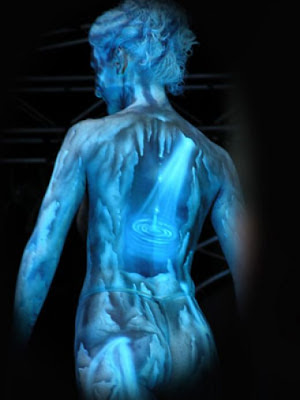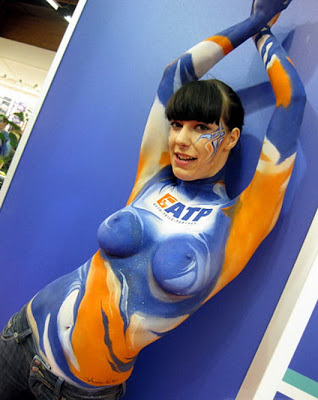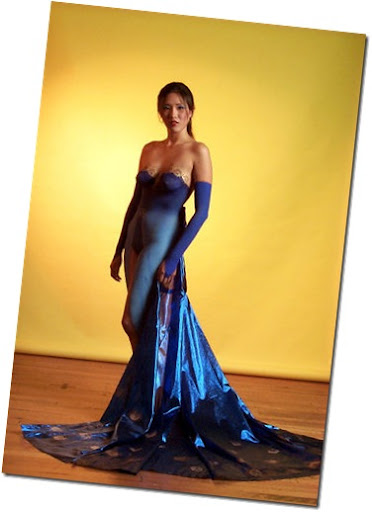Wednesday, June 30, 2010
Tuesday, June 29, 2010
Body Painting Girls Pictures
Original Body Painting Women
Monday, June 28, 2010
Antique Russian Body Painting Festival | Body Painting Design
Full Color Body Painting | Body Painting Design
Girls Body Painting | Body Painting Design
Body Painting Fashion Show | Body Painting Design
Popular Tribal Tattoo Ideas
 Tribal Tattoos, although may appear to be simple at times, are undoubtedly appealing and among the most popular today. This article will help those especially new to the world of tattoos in general and particularly, Tribal Tats. The following walk through history will help shed light on some of the different Tribal Tattoo Ideas used throughout the decades.
Tribal Tattoos, although may appear to be simple at times, are undoubtedly appealing and among the most popular today. This article will help those especially new to the world of tattoos in general and particularly, Tribal Tats. The following walk through history will help shed light on some of the different Tribal Tattoo Ideas used throughout the decades.The most common Tribal Tats found today dates back to the polynesians who used black, geometric tatau ornaments which appeared to be silhouette-like in many ways. In Europe, sailors were attributed for the earliest Tribal Tat ideas - they originated from Tahiti and were added together with the sailors' own maritime-themed designs. Over the years, they have evolved to become what is known as traditional tattoos.
Over in America, Leo Zulueta and Don Ed Hardy, an innovator, were both responsible for an exciting Tribal Tats boom in 1982 when they started "Tattoo Time", a magazine on tattoos. Featuring native Borneo and Samoan tattoos, it quickly popularized these tattoo ideas as a form of interesting tattoo style and design.
As illustrated from above, these modern day tattoos have strong ties and affiliation with natives and tribes from different parts of the world. It was from there that they slowly evolved into the Tribal Tattoo ideas we have today. Although it has been said that a handful of tattoo parlors and tattoo artists would turn down tribal tattoo designs due to their simplicity, a lot of tattoo enthusiasts begs to differ. Tribal Tats, as a matter of fact, needs articulate skill to be tattooed on the difficult body parts in order for it to look naturally "grown". In addition, it has also been said that the coloring of these tattoos requires a steady hand.
You can find an assortment of tribal tat ideas ranging from tribal armbands, flames, black, crosses, stars, tigers and an assortment of motives and designs that are based on tribal motives. Personally, I have 3 tribal tattoos tattooed on different parts of my hands - one of a tribal flame on my right shoulder, one of a tribal motive which I designed on my left shoulder and another circular tribal design on my right wrist.
Tattoos and History (A Love Story)
 Ritualistic tattoos:
Ritualistic tattoos:We are living in times where tattoos and body modification are more associated with fashion than related to the original idea of getting your body permanently marked for magic, spiritual or personal reasons.
Actually many believe that the first tattoos were created by accident. The most viable theory that I read was that some tribes used to treat open wounds by rubbing or patching them with some kind of herb or flower elixir, which probably produced some kind of ink. This ink while in touch with the cut created a permanent mark and at the same time due to the phototherapeutic use of it helped the wound to heal.
Even if the original meaning and origin of body modification is mostly lost along the history we know that thousands of years ago it was used in many different ways, mostly deriving from the human believes and creativity.
The little that we know about tattoo and corporal modification history allow us to say that they were sometimes used not only as part of healing or transition rituals. They were also used as identification between tribes, bravery and adulthood signs. Some warriors like the Vikings used to get their faced tattooed to frighten their rivals. Other tribes used to tattoo their female's faces to avoid them from being kidnapped or raped by enemies.
In other barbarian cultures, which became famous for their cruelty, before killing their tattooed prisoners the warriors were given the right to de-flash their prisoners and use the adorned skin as a protection charms. The same procedures interestingly enough were repeated during the WWII, but with non adorned skins. What says tons about development and modern civilization.
At this time tattoos, scarification and insertion of seeds and pits under human skin were well seen around the primitive world. Unfortunately in Persia, due to its non erasable character; Tattoos became a way of marking slaves. This idea somehow pleased the Greeks and the Romans which not only marked their slaves; they also tattooed thieves and outlaws.




